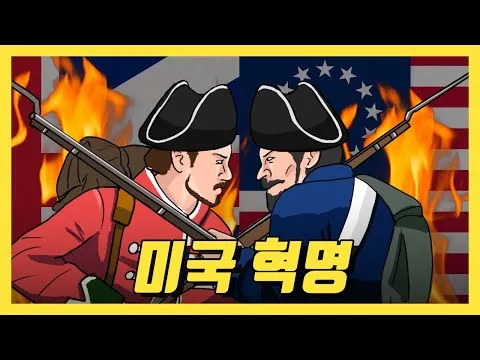@valued-customer/how-youre-being-tricked-to-enslave-yourself

It is very difficult for an East Asian like me to understand the excellent diplomatic and political sentences of my respected senior @valued-customer!😅
Perhaps his great English sentences can be understood by American college graduates!
It was very difficult for an American elementary school-level English speaker like me to understand his English!
However, because I always enjoy taking on reckless and foolish challenges, I often read @valued-customer's great and difficult English sentences!😂
It isn't theoretical that we're being lied to by politicians. There isn't a demographic today of adults compos mentus that believes our governments are comprised of saints, manning the bureaucratic walls to defend to the last drop of their life's blood our freedom and felicity. We are all quite aware that liars run for office, tell us lies during their candidacy, and then their actions in office tell us the truth after we have been either bamboozled to vote for them based on their false rhetoric, or the vote counting bureaucracies just fake up enough ersatz votes to pretend we did.
It doesn't matter which side of which controlled issue you're on. What's funny is a lot of people believe with zealotry that on their specific Issue of Relevance their Chosen Candidate is Telling the Truth. People kill each other over their political fervor for such parties, personnel, and policies. We are built to create powerful societies that can withstand attacks to successfully reproduce, and this is primarily a behavioural evolution. True believers are the wall that defends our children.
Dissent is dysgenic. Fanatical fervor for feckless fuhrers is what furthers our genetic line, instead of ferreting out facts and holding psychopathic overlords in check, because there is a common benefit to our reproductive success and the increase in wealth and power of the particular psychopathic overlord farming our community. When that overlord is able to conquer and control the neighboring farm, or village, or nation, they use their minions - us - to do so, and we are the useful idiots they cultivate and perpetuate.
Rather, that used to be the case, when foot soldiers were necessary to wage war, and human operated devices were the state of the art of mass destruction. Drones and DEWs in a bewildering variety today render actual boots irrelevant in most of the actual killing of enemy forces, and only necessary to the bureaucratic processes requisite to establishing control of conquered properties and peoples. As all of us will note, automated mechanisms increasingly replace humans in every bureaucratic process as well, leaving psychopathic overlords with a burden of populations that used to be necessary to attain to their sybaritic lifestyles, but now not only are obsolete in that regard, but huge detriments to the fullest enjoyment of their properties and wealth.
I kind of understand why the Japanese overlords who met @valued-customer's ancestors said Americans were the most dangerous!🤣
@goldgrifin007/3-why-japanese-fear-america-forever
Having been taught to obey my overlords for 2000 years, I felt that @valued-customer was a very dangerous person in the eyes of my overlords!😆
James Corbett lays out very well in his latest report, titled "Don't Worry! The Border Problem is About to be Solved!", how our overlords use controlled opposition to enable the politicians to create the system of herd management, the chutes and ladders we will be confined to in order we be corralled securely, before the abattoirs are fired up and our vast herds are appropriately culled. Controlled Actor A rants about protecting us from invading forces, and implements dual use infrastructure potential to keeping our Elysian Fields for our exclusive benefit, and then Controlled Actor B utterly sabotages those mechanisms and fully afflicts us with the hazards and ills hordes of invading foreigners bring with them, keeping at all times the awareness that the infrastructure of population control is applicable to we ourselves more or less covert, both sides of the controlled opposition herd us to clamor for implementation of that infrastructure of population control, dangling the fantasy it is for our benefit rather than theirs, in front of our bred to zealously serve eyes.
Every control we are convinced to clamor for securing our borders will be applied within our borders, to us. Every wall has two sides. Whether you're convinced we need to eliminate illegal immigration, or are convinced hapless people driven to come to our Elysium have every right to a life of freedom and felicity, you are entrained into the narrative that psychopathic overlords are employing to create horrific corrals that will be used to eliminate populations that are excessive drains on their wealth, and you are the carbon they want to reduce.
All of the political contests, media blitzes, and news of the day are psychological warfare against everyone that isn't an overlord - and only if you are one do you not wonder who is one. The actual field of battle on which our survival can be won is possession of automated means of production competent to secure to us and our posterity the blessings of civilization, which include the ability to go where we wish and enjoy such wonders as exist.
If you cannot travel freely at your whim, you are part of the herd that will be corralled.
Because of my respected predecessor @valued-customer's great sentences, he would probably be sentenced to 5 years in prison in my world!
I hope @valued-customer doesn't feel offended after reading my rude English sentences!
If he were a citizen of the country I live in, he would definitely be sentenced to 5 years in prison!
I hope he understands that the politics, economy, and class system of the East Asian world are completely different from those of the United States!
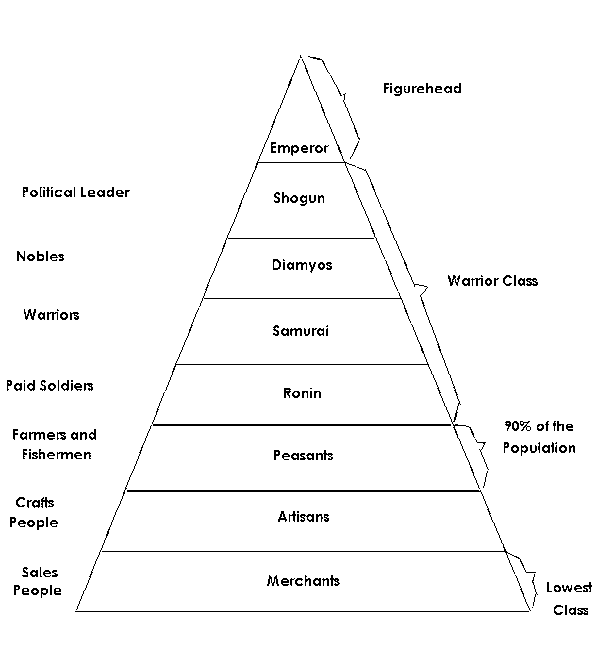 Japanese Feudal System
Japanese Feudal System
Just like England in Medieval times, Japan also had a feudal system. It was structured very similarly to the English setup with a few changes of names and positions. The most powerful positions in society were the Emperor, Shogun, Daimyo and Samurai. Although these 4 positions were the most powerful in Japan at the time, they made up only roughly 10% of the total population, while roughly 90% were peasants and below.
The Emperor was looked up to by all of his people as the supreme ruler but held little political power and was seen as more of a 'puppet figure'.
The Shogun was probably the most important figure in Japanese society. He was seen as 'second in line' but did the most work. He was a military leader, so he was in charge of many of decisions to do with their armies, battles etc..
The Daimyo was a very powerful figure who served the shogun. His job control a large area of land. He was also in charge of their samurai, whom he paid to work and protect him.
The Samurai were Japanese warriors (similar to the European knight). They served and protected their Daimyo with respect. They also fought for their people and protected them, bringing justice and order to the community. Their followed a code of conduct called Bushido, meaning 'Way of the warrior' which told them how to live their lives.
Ronins were samurai warriors who had either been 'expelled' from their allegiance or their daimyo had died.
Peasants were farmers and fishermen. They were actually considered a higher class in Medieval Japan than in Medieval England because the Japanese believed that the peasants produced food, which was depended on by all classes, therefore, they worked harder.
Artisans were workers skilled in a particular trade. These included: sword-maker, dressmaker, woodblock print making etc.
Merchants were considered the lowest class in Medieval Japan unlike Medieval England. Their job was to trade/sell goods and shop-keep.
The world I live in has the caste system of the Japanese Middle Ages.
On the outside, it is a republic like the United States, but internally there is a class system.
Marriage and employment are only possible between people of the same social class.
I am the son of a poor merchant.😃
If it is revealed that a person of my status is talking about this kind of thing to an American like you, I will probably be punished by the state.
Anyone who tells the truth that the overlords want to hide will be punished!
Maybe you can understand why people in my world don't talk to you!
A person who receives a red ticket from the overlords once will suffer losses in future employment and promotions.
So, everyone avoids talking to foreigners like you, especially Americans.🤣
A Turning Point for SK’s Weaponization of Defamation Laws?
So, I can understand and accept your antipathy towards the overlords of the world!
I think your prophecy is correct!
I want to tell you about the East Asian overlords, especially the Japanese overlords!
This is because the overlords who rule the world I live in are descendants of the overlords of Japan.
@goldgrifin007/2-why-japanese-fear-america-forever
I wonder if you remember that I learned about American and European history, religion, philosophy, and science from Japanese overlords.
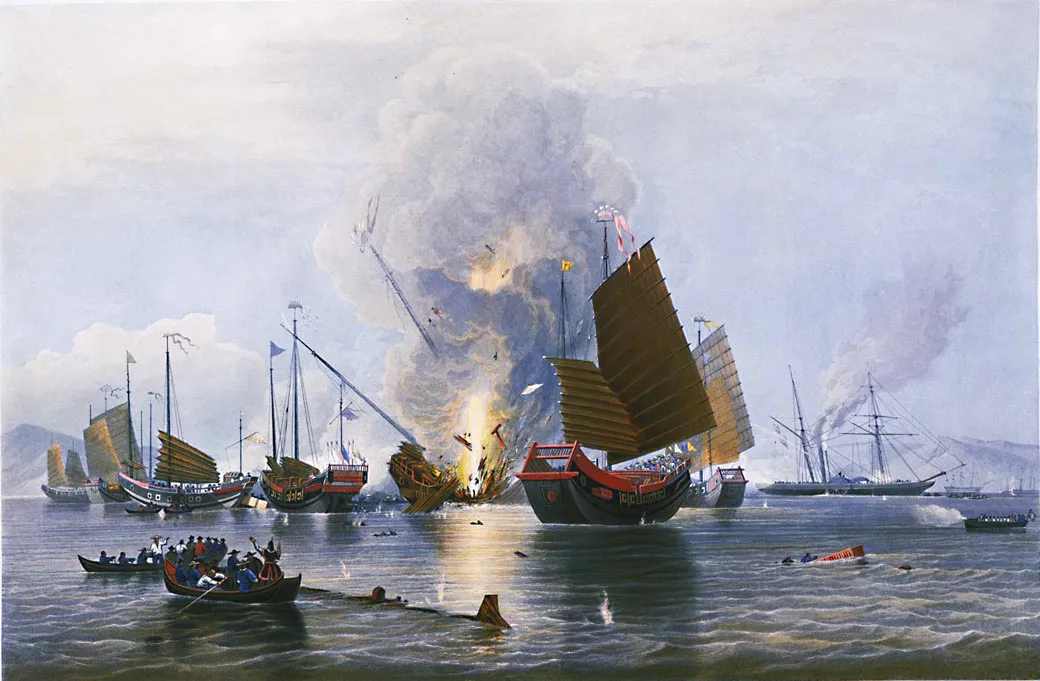 Naval battle in the First Opium War
Naval battle in the First Opium War
The Opium Wars (simplified Chinese: 鸦片战争; traditional Chinese: 鴉片戰爭 Yāpiàn zhànzhēng) were two conflicts waged between China and Western powers during the mid-19th century.
The First Opium War was fought from 1839 to 1842 between China and Britain. It was triggered by the Chinese government's campaign to enforce its prohibition of opium, which included destroying opium stocks owned by British merchants and the British East India Company. The British government responded by sending a naval expedition to force the Chinese government to pay reparations and allow the opium trade. [1] The Second Opium War was waged by Britain and France against China from 1856 to 1860. It resulted in the legalisation of opium in China. [2]
In each war, the superior military advantages enjoyed by European forces led to several easy victories over the Chinese military, with the consequence that China was compelled to sign the unequal treaties to grant favourable tariffs, trade concessions, reparations and territory to Western powers. The two conflicts, along with the various treaties imposed during the "century of humiliation", weakened the Chinese government's authority and forced China to open specified treaty ports (including Shanghai) to Western merchants.[3][4] In addition, China ceded sovereignty over Hong Kong to the British Empire, which maintained control over the region until 1997. During this period, the Chinese economy also contracted slightly as a result of the wars, though the Taiping Rebellion and Dungan Revolt had a much larger economic effect.[5]
The Opium Wars (simplified Chinese: 鸦片战争; traditional Chinese: 鴉片戰爭 Yāpiàn zhànzhēng) was a huge shock to all East Asians.
China is the largest country in Asia and had authority as the leader of all of East Asia.
However, the fact that the British Empire brought about the disastrous collapse of China was a great shock to both Japan and Korea.
At the time, the Chinese called Queen Victoria a honorless heinous criminal.
I wonder if my esteemed predecessor @roleerob is worried that I said something rude to The great Queen Victoria!😂
In any case, the Japanese and Koreans were filled with fear when they saw the noble Queen of British ordering the British Navy to destroy China.
The Japanese and Koreans became fearful of invasion from Europe, including the British Empire.
However, Queen Victoria and her European friends focused only on colonizing China, which had the world's largest territory, resources, and population.
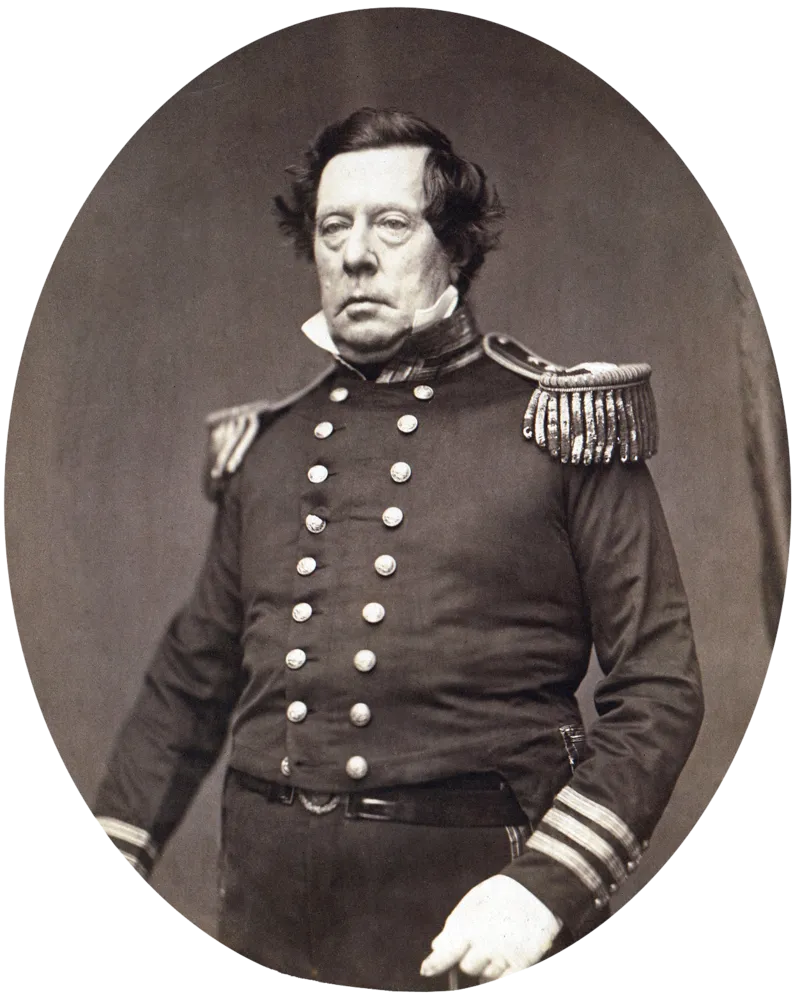 Commodore Matthew Perry
Commodore Matthew Perry
The Perry Expedition (Japanese: 黒船来航, kurofune raikō, "Arrival of the Black Ships") was a diplomatic and military expedition in two separate voyages (1852–1853 and 1854–1855) to the Tokugawa shogunate by warships of the United States Navy. The goals of this expedition included exploration, surveying, and the establishment of diplomatic relations and negotiation of trade agreements with various nations of the region. Opening contact with the government of Japan was considered a top priority of the expedition, and was one of the key reasons for its inception.
The expedition was commanded by Commodore Matthew Calbraith Perry, under orders from President Millard Fillmore. Perry's primary goal was to force an end to Japan's 220-year-old policy of isolation and to open Japanese ports to American trade, through the use of gunboat diplomacy if necessary. The Perry Expedition led directly to the establishment of diplomatic relations between Japan and the western Great Powers, and eventually to the collapse of the ruling Tokugawa shogunate and the restoration of the Emperor. Following the expedition, Japan's burgeoning trade routes with the world led to the cultural trend of Japonisme, in which aspects of Japanese culture influenced art in Europe and America.
The Perry Expedition (Japanese: 黒船来航, kurfune raikō, "Arrival of the Black Ships") was a major historical event that changed the fate of Japan.
The island nation of Japan was able to avoid invasion and conquest by foreign powers for 2,000 years because it is surrounded by the Pacific Ocean, the largest and most violent ocean in the world.
Major military efforts were taken by Kublai Khan of the Yuan dynasty in 1274 and 1281 to conquer the Japanese archipelago after the submission of the Korean kingdom of Goryeo to vassaldom. Ultimately a failure, the invasion attempts are of macro-historical importance because they set a limit on Mongol expansion and rank as nation-defining events in the history of Japan. The invasions are referred to in many works of fiction and are the earliest events for which the word kamikaze (神風 "divine wind") is widely used, originating in reference to the two typhoons faced by the Yuan fleets.
The invasions were one of the earliest cases of gunpowder warfare outside of China. One of the most notable technological innovations during the war was the use of explosive, hand-thrown bombs.[7]
After repelling the invasion of the Yuan Empire and its Korean allies in the 13th century, the Japanese claimed to be a great nation protected by the gods.
However, the emergence of a Christian empire across the Pacific plunged the Japanese into a state of fear.
Who are the Americans?
In what ways are they different from Europeans?
The Japanese overlords had some knowledge of Europeans, but they had met Americans for the first time in their lives.

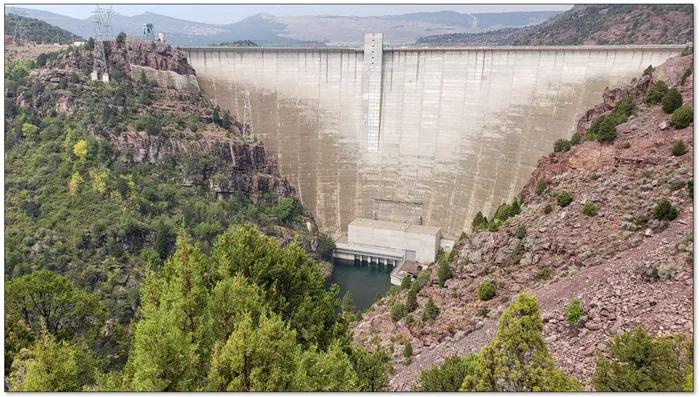
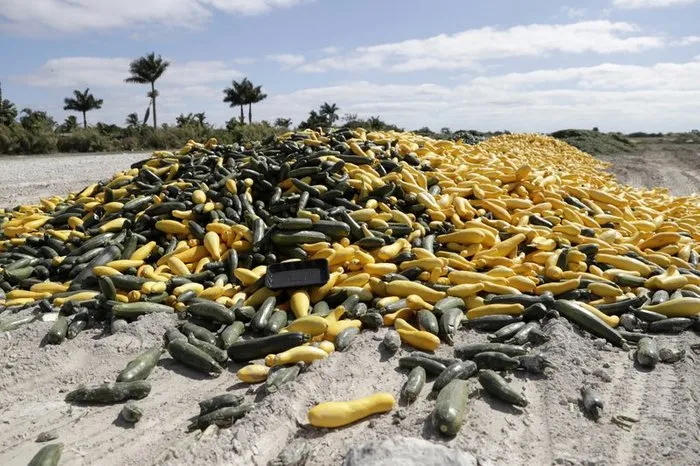
Japanese overlords dispatched many spies to the North American continent and began reconnaissance.
They were astonished by the wealth and vastness of the North American continent!😨
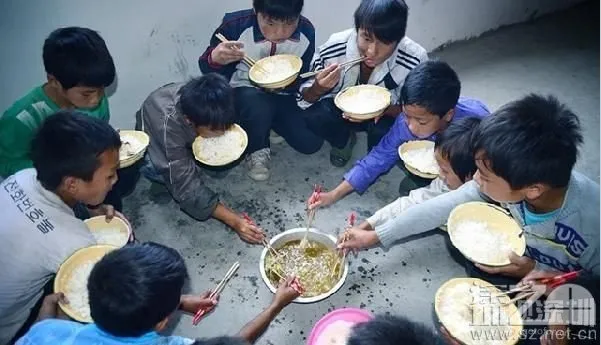
Japan, China, and Korea were all poor and always had a shortage of food and resources, but America is so rich in everything!
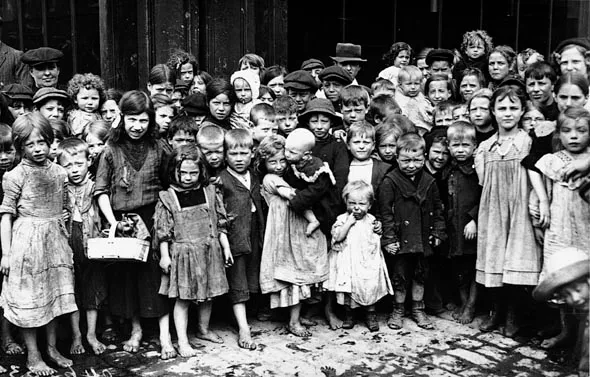
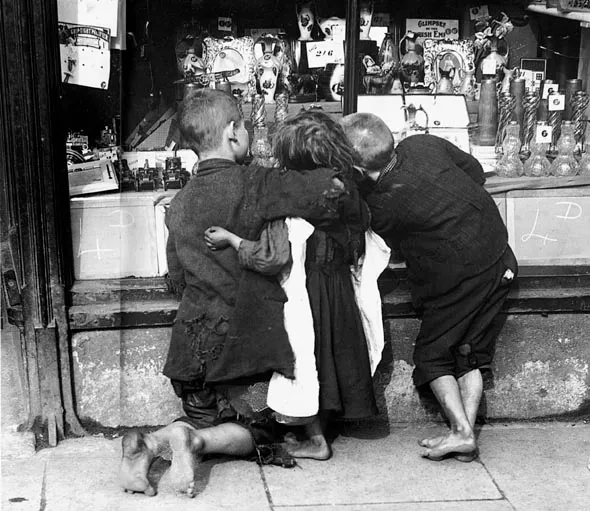
London slum children
The overlords of Japan, China and Korea looked at the slums of London and discovered that Europeans were less wealthy than East Asians!😲

American common people's meals
However, it was surprising that common people in the United States ate their fill!😳
Although there are many poor people in the United States, the abundance of American people's diet surprised Japanese, Chinese, and Korean people!
I wonder if Steve, @valued-customer and Joseph enjoy meals like that every day!

It's amazing how my brother Joseph maintains such a slim physique while eating like that!😄

I think Joseph's secret to maintaining a slim body should be taught to these women!😆
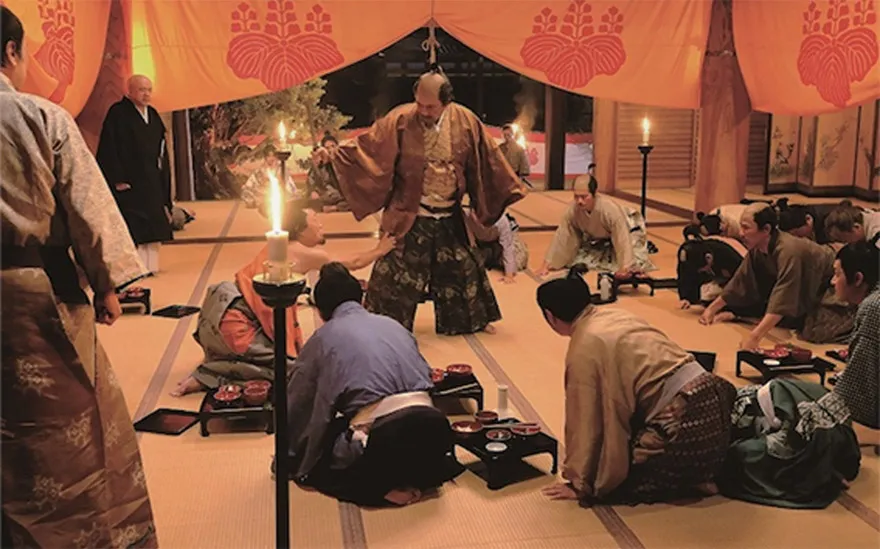
Japan's overlords
When Japan's overlords saw America's infinite wealth and vast territory, they felt fear, envy, and jealousy!
Japan is currently at war with the United States and cannot win!
Japan's overlords were convinced that America would conquer Japan in the near future!
They began researching ways to win a future war with the United States!
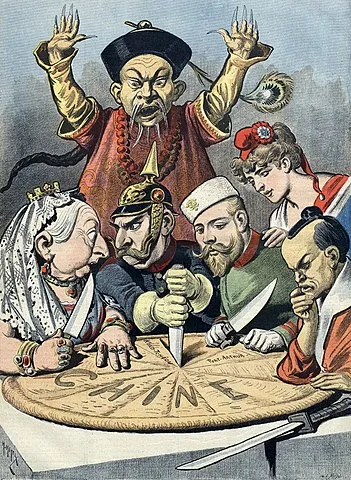 A French political propaganda cartoon depicting China as a pie about to be carved up by Queen Victoria (United Kingdom), Kaiser Wilhelm II (Germany), Tsar Nicholas II (Russia), Marianne (France) and a samurai (Japan), while Boxer leader Dong Fuxiang protests
A French political propaganda cartoon depicting China as a pie about to be carved up by Queen Victoria (United Kingdom), Kaiser Wilhelm II (Germany), Tsar Nicholas II (Russia), Marianne (France) and a samurai (Japan), while Boxer leader Dong Fuxiang protests
The Boxer Rebellion, also known as the Boxer Uprising, the Boxer Insurrection, or the Yihetuan Movement, was an anti-imperialist and anti-Christian uprising in China between 1899 and 1901, towards the end of the Qing dynasty, by the Society of Righteous and Harmonious Fists (Yìhéquán). The rebels were known as the "Boxers" in English because many of its members had practised Chinese martial arts, which at the time were referred to as "Chinese boxing". It was defeated by the Eight-Nation Alliance of foreign powers.
After the Sino-Japanese War of 1895, villagers in North China feared the expansion of foreign spheres of influence and resented the extension of privileges to Christian missionaries, who used them to shield their followers. In 1898 North China experienced several natural disasters, including the Yellow River flooding and droughts, which Boxers blamed on foreign and Christian influence. Beginning in 1899, Boxers spread revolution across Shandong and the North China Plain, destroying foreign property such as railroads and attacking or murdering Christian missionaries and Chinese Christians. The events came to a head in June 1900 when Boxer fighters, convinced they were invulnerable to foreign weapons, converged on Beijing with the slogan "Support the Qing government and exterminate the foreigners."
Diplomats, missionaries, soldiers, and some Chinese Christians took refuge in the diplomatic Legation Quarter, which the Boxers besieged. An Eight-Nation Alliance of American, Austro-Hungarian, British, French, German, Italian, Japanese and Russian troops moved into China to lift the siege and on 17 June stormed the Dagu Fort at Tianjin. The Empress Dowager Cixi, who had initially been hesitant, supported the Boxers and on 21 June issued an Imperial Decree, a de facto declaration of war, on the invading powers. Chinese officialdom was split between those supporting the Boxers and those favouring conciliation, led by Prince Qing. The supreme commander of the Chinese forces, the Manchu General Ronglu (Junglu), later claimed he acted to protect the foreigners. Officials in the southern provinces ignored the imperial order to fight against foreigners.
The Eight-Nation Alliance, after initially being turned back by the Imperial Chinese military and Boxer militia, brought 20,000 armed troops to China. They defeated the Imperial Army in Tianjin and arrived in Beijing on 14 August, relieving the fifty-five day siege of the Legations. Plunder of the capital and the surrounding countryside ensued, along with summary execution of those suspected of being Boxers in retribution. The Boxer Protocol of 7 September 1901 provided for the execution of government officials who had supported the Boxers, provisions for foreign troops to be stationed in Beijing, and 450 million taels of silver—more than the government's annual tax revenue—to be paid as indemnity over the course of the next 39 years to the eight nations involved. The Qing dynasty's handling of the Boxer Rebellion further weakened their control over China, and led the dynasty to attempt major governmental reforms in the aftermath.
The Boxer Rebellion gave Japan's overlords new hope!
They felt they had discovered a crucial difference between Americans and Europeans!
As Protestants, Americans give the highest priority to Christian missions to East Asia. However, Europeans prioritize the conquest and exploitation of colonies.
Having reached this brilliant conclusion, Japan's overlords decided that the United States was a more dangerous adversary than Europe!
In particular, civilian @valued-customer, a humble American hunter and carpenter, was concluded to be the most dangerous thinker to the overlords!
They believed that American Christianity would destroy the polytheistic religions that created Japan's greatness and sanctity, as the rebellious and dangerous @valued-customer opposed the popes, emperors, and kings of Europe!
They believed that American Christianity created rebellious and dangerous liberals like @valued-customer!
They believed that by forming alliances with European empires, including Great Britain, they could prevent @valued-customer's invasion of Japan!
They believed that alliance and coexistence with the European overlords was possible!
However, they believed that coexistence with @valued-customer was forever impossible!
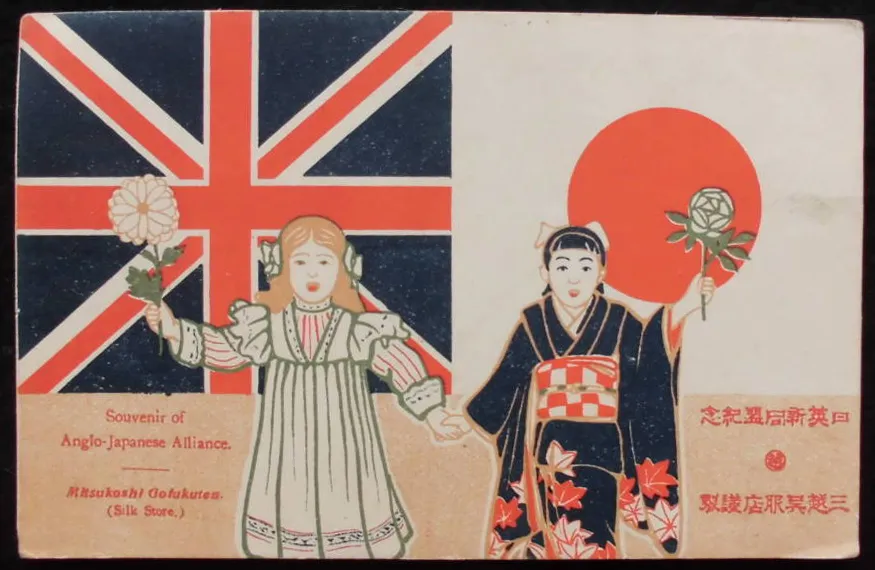 Commemorative postcard 1905
Commemorative postcard 1905
The first Anglo-Japanese Alliance (日英同盟, Nichi-Ei Dōmei) was an alliance between Britain and Japan. It was in operation from 1902 to 1922. The original British goal was to prevent Russia from expanding in Manchuria while also preserving the territorial integrity of China and Korea. For the British, it marked the end of a period of "splendid isolation" while allowing for greater focus on protecting India and competing in the Anglo-German naval arms race. The alliance was part of a larger British strategy to reduce imperial overcommitment and recall the Royal Navy to defend Britain. The Japanese, on the other hand, gained international prestige from the alliance and used it as a foundation for their diplomacy for two decades. In 1905, the treaty was redefined in favor of Japan concerning Korea. It was renewed in 1911 for another ten years and replaced by the Four-Power Treaty in 1922.[1]
The alliance was signed in London at Lansdowne House on 30 January 1902 by Lord Lansdowne, British Foreign Secretary, and Hayashi Tadasu, Japanese diplomat.[2]
The Anglo-Japanese alliance was renewed and expanded in scope twice, in 1905 and 1911, playing a major role in World War I before the alliance's demise in 1921 and termination in 1923.[3][4][5]
The main threat for both sides was from Russia. France was concerned about war with Britain and, in cooperation with Britain, abandoned its ally, Russia, to avoid blame for the Russo-Japanese War of 1904. France supported Russia economically against Japan anyway. However, Britain siding with Japan angered the United States and some British dominions, whose opinion of the Empire of Japan worsened and gradually became hostile.[6]
Japan–Russia Secret Agreements
The Japan–Russia Secret Agreements were a series of four secret treaties signed between Empire of Japan and Russian Empire after the Russo-Japanese War, in order to secure and recognize the rights of both sides in areas of the East Asia, specifically the Korean Peninsula, Manchuria, and Mongolia.[1] They were signed four times between 30 July 1907 and around 3 July 1916, and were abrogated by the Soviet government after the Russian Revolution in 1917.
The First Treaty
After the Russo-Japanese War, the First Treaty was signed on 30 July 1907 by Motono Ichirō, the Japanese Ambassador in Moscow, and Alexander Izvolsky, the Foreign Minister of Russia. The treaty was divided into two parts: one is open agreement, which respected the treaties concluded between the two countries and China, respected China's independence, promoted open doors, and achieved equal opportunities and another is secret agreement, which defined the scope of Japan's interests in Southern Manchuria and Russia's interests in Northern Manchuria and Japan recognized Russia's interests in Outer Mongolia, and Russia recognized Japan's interests in the Korean Peninsula.[3]
The Second Treaty
The Second Russo-Japanese Treaty was signed on 4 July 1910 by Motono Ichirō, the Japanese Ambassador in Moscow, and Alexander Izvolsky, the Russian Minister of Foreign Affairs, which explicitly rejected the United States' proposed South Manchurian Railway Neutrality Act (the Knox's proposal) and ensured the rights and interests of both sides in Manchuria.[4]
The Third Treaty
On 8 July 1912, Ambassador Motono Ichirō and Russian Foreign Minister Sergei Sazonov signed the Third Treaty against the background that, as a result of the outbreak of the 1911 Revolution in China, the Republic of China replaced the Qing Dynasty and Japan and Russia divided the spheres of influence of the two countries in Inner Mongolia, with the treaty stipulating that the western sphere of influence of Inner Mongolia belonged to Russia and the eastern sphere of influence of Inner Mongolia to Japan.[5]
The Fourth Treaty
On 3 July 1916, Ambassador Motono Ichirō and Russian Foreign Minister Sergei Sazonov signed the Fourth Treaty, which strengthened the alliance between the two countries during World War I and protected their rights and interests in Manchuria and Mongolia from Chinese challenges. The Russo-Japanese alliance ended in 1918 with the fall of the Tsarist Empire at the end of World War I.[6]
The Japanese overlords wanted to form an alliance with the European overlords to defeat @valued-customer because the civilian @valued-customer was their most feared enemy!
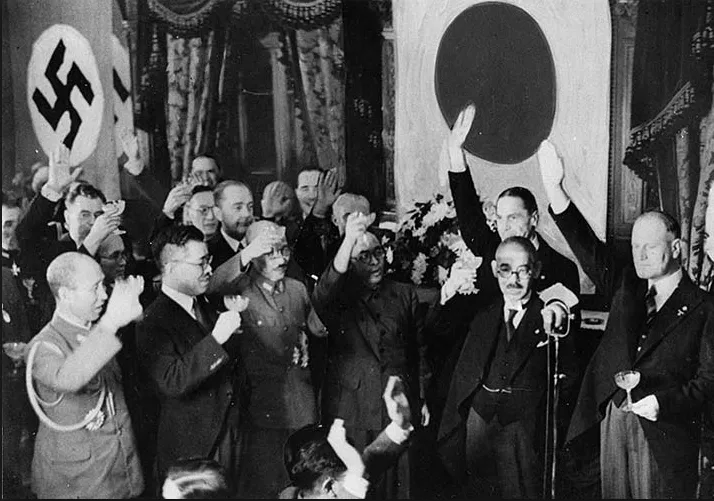
The Tripartite Pact, also known as the Berlin Pact, was an agreement between Germany, Italy, and Japan signed in Berlin on 27 September 1940 by, respectively, Joachim von Ribbentrop, Galeazzo Ciano and Saburō Kurusu (in that order) and in the presence of Adolf Hitler.[1] It was a defensive military alliance that was eventually joined by Hungary (20 November 1940), Romania (23 November 1940), Bulgaria (1 March 1941) and Yugoslavia (25 March 1941) as well as by the German client state of Slovakia (24 November 1940). Yugoslavia's accession provoked a coup d'état in Belgrade two days later. Germany, Italy and Hungary responded by invading Yugoslavia. The resulting Italo-German client state, known as the Independent State of Croatia, joined the pact on 15 June 1941.
The Tripartite Pact was, together with the Anti-Comintern Pact and the Pact of Steel, one of a number of agreements between Germany, Japan, Italy, and other countries of the Axis Powers governing their relationship.[2]
The Tripartite Pact formally allied the Axis Powers with one another, and it was directed primarily at the United States.[3] Because of the distance difference between Japan and the two European Powers, the pact recognized two different regions that were to be under Axis rule. [4] Japan recognized “the leadership of Germany and Italy in the establishment of a new order in Europe.” In return, Germany and Italy recognized Japan’s right to establish a new order “in Greater East Asia.” [5] But the pact's practical effects were limited since the Italo-German and Japanese operational theatres were on opposite sides of the world, and the high contracting powers had disparate strategic interests. As such the Axis was only ever a loose alliance.[6] Its defensive clauses were never invoked,[7] and signing the agreement did not oblige its signatories to fight a common war per se.[8]
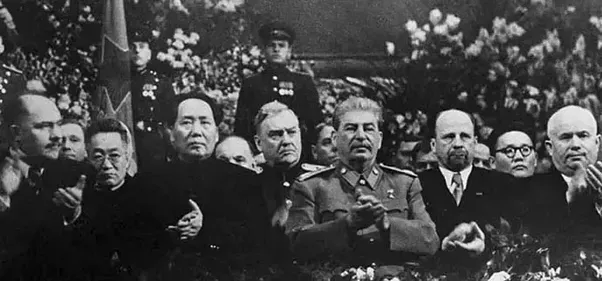
Mao Zedong visits Moscow to commemorate Stalin's 70th birthday.
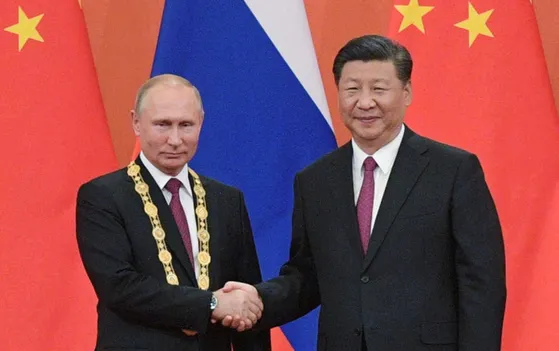
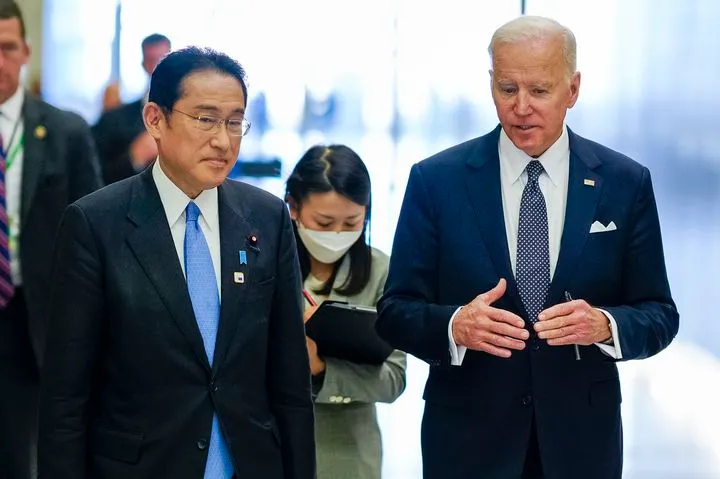
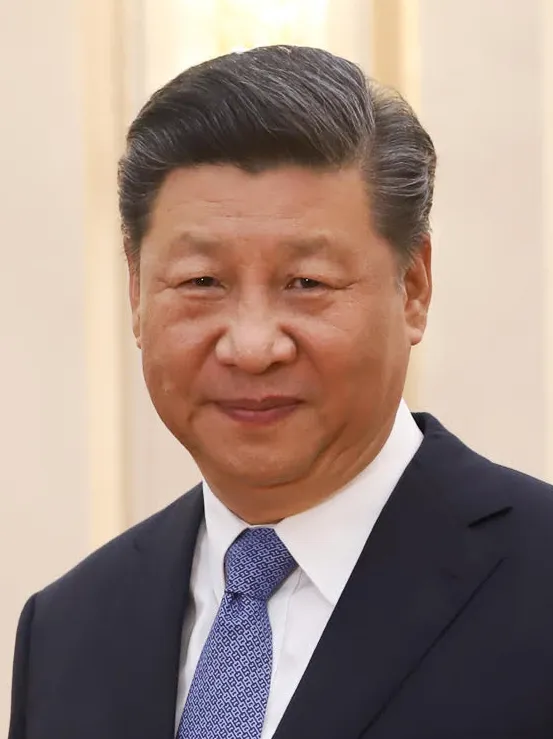
Disclaimer: I hope Steve and @valued-customer understand my awkward and rude English!😂


